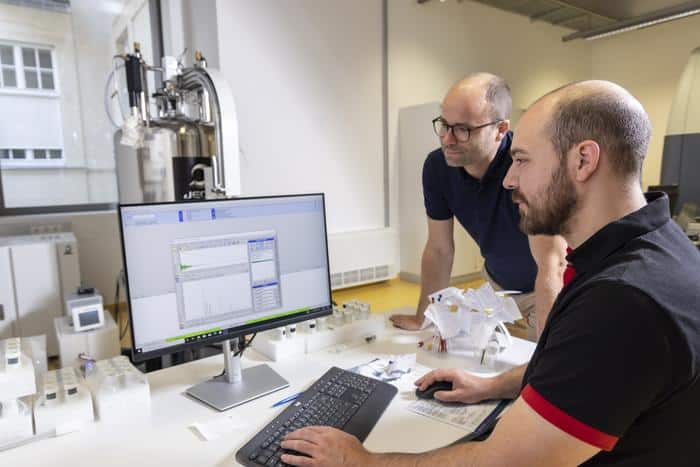The global production of semiconductors is growing rapidly and with it the demand for primary products, especially crystalline silicon. However, its production is very energy-intensive and only half of the raw silicon used is actually utilised. This leads to large quantities of waste. In the Christian Doppler Laboratory for New Semiconductor Materials Based on Functionalized Hydrosilanes, which opened today, a team led by laboratory manager Michael Haas from the Institute of Inorganic Chemistry at Graz University of Technology (TU Graz) is carrying out research on alternatives. Funded by the Austrian Ministry of Economics and Labour, the researchers are working with corporate partner Air Liquide Advanced Materials to explore new types of starting materials for the more energy-efficient production of semiconductors. The focus is on the processing of functionalised hydrosilanes. These are chemical compounds that are primarily made up of silicon and hydrogen atoms.
Austrian Ministry of Economics and Labour promotes research into new semiconductor materials
Minister of Economics and Labour Martin Kocher, whose ministry contributes significantly to the public funding of the CD laboratories, says: “Semiconductors are key technologies for the business location. In recent years, Austria has been able to establish itself as an important country for microelectronics research and production. This secures high-quality jobs and strengthens competitiveness. The CD lab opened today is conducting research on premium semiconductors for the computer industry and promoting technological progress. Hydrosilanes in particular are considered a promising material for the future. Research into their chemical properties is creating the basis for new innovative semiconductor materials. This benefits everyone involved, especially Austria as a high-tech location.”
“The great advantage of hydrosilanes is the instability of these compounds above 300 °C or when exposed to UV light. The relatively weak bonds between the silicon atoms then break within minutes,” explains laboratory manager Michael Haas. “Liquid phase deposition can be used to obtain silicon that is suitable for solar cells or semiconductor applications.” Due to the low temperature, the energy consumption of this process is comparatively low. There is a considerable need for research into the use of functionalised hydrosilanes for the production of doped silicon films – silicon layers that are enriched with so-called “foreign atoms” in order to specifically influence the material properties.
To close this gap, the researchers will produce and characterise novel functionalised hydrosilanes in order to subsequently process doped silicon layers using various deposition techniques. Finally, they will determine the relevant parameters of these new semiconductor materials, including their morphology, conductivity, absorption properties and element distribution. “Our aim is to develop new methods to enable the production of versatile silicon-based semiconductor materials in an energy- and resource-efficient way. This would benefit industry, end customers and the environment in equal measure,” says Michael Haas.
About Christian Doppler labs
In Christian Doppler labs, application-orientated basic research is carried out at a high level, with outstanding scientists collaborating with innovative companies. The Christian Doppler Research Society is internationally regarded as an example of best practice in promoting this collaboration. Christian Doppler labs are jointly funded by the public sector and the participating companies. The most important public funding body is the Federal Ministry of Economics and Labour (BMAW).
